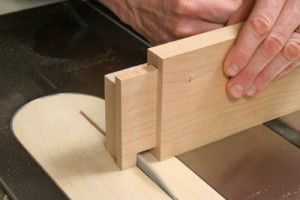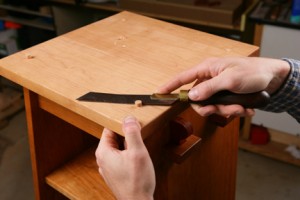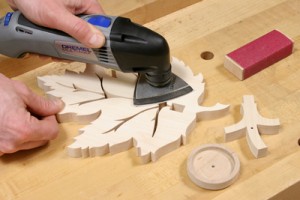 Did you kick off 2011 with any resolutions? Initially I didn’t think I would, since they never seem to stick. But, I’m going to adopt one after all: Keep it simple, and do it well.
Did you kick off 2011 with any resolutions? Initially I didn’t think I would, since they never seem to stick. But, I’m going to adopt one after all: Keep it simple, and do it well.
Yep, I like the sound of it.
Here’s my reasoning: I think “simple” gets a bad rap in woodworking. It’s easy to fall into a mindset that a project with only a few parts, or with some modest joinery, is easy … and it’s less admirable to build an easy project than something with a huge cut list or more complex construction. Easy projects are for novices, right? I think that’s based on a presupposition that the goal of woodworking is to master it. And, by extension, to be after something less than mastery is somehow a sign of not trying hard enough. Copping out, so to speak.
Maybe we’re hard-wired to raise our own bars of expectation. Whether it’s our golf game, the next promotion at work, a grade at the end of the term or a woodworking skill, the goal is to get past the bottom rung and eventually become an intermediate or expert.
Honestly (and I’ll underscore that this is my own opinion here), some magazines support this kind of thinking. Sure, part of the goal of woodworking publishing is to help challenge those who already have a high degree of skill — to offer some demanding projects and techniques that will keep expert-level woodworkers happy. But I support the opposite view as well: less complex projects can be just as gratifying if you put your heart into them. Simple things done well feel pretty darn good at the end of the day.
Here are a few virtues of embracing simplicity:
 Simple gets done. The more complexity you design into a project, the more potential pitfalls you create that might stop you short of completion. There’s nothing wrong with challenging yourself, but not if the goal is to finish something that never gets finished. I’ve got a few of those projects in the shop right now. Worked myself into a corner, took a few bad turns along the way and now they sit, undone. I’m not particularly proud of them, yet I just can’t toss them out. I’m stuck. I should have kept things simpler and done a better job while I was at it.
Simple gets done. The more complexity you design into a project, the more potential pitfalls you create that might stop you short of completion. There’s nothing wrong with challenging yourself, but not if the goal is to finish something that never gets finished. I’ve got a few of those projects in the shop right now. Worked myself into a corner, took a few bad turns along the way and now they sit, undone. I’m not particularly proud of them, yet I just can’t toss them out. I’m stuck. I should have kept things simpler and done a better job while I was at it.
Simple can bring focus. Instead of trying to “wow” yourself or someone else with a whizbang triple interlocking dovetail with a half twist, how about focusing on making airtight half-blind dovetails. You know, the “simpler” versions you’ve been making for years? Tweak that dovetail jig until there isn’t the slightest gap — shoot for making the best half-blinds you’ve ever seen. Or, take what might otherwise be a hasty sanding job and focus on creating a velvety-smooth finish that’s a joy to touch…no matter where on the project you happen to reach. Not a single nib or sharp edge anywhere. If the project requires screws, try cutting your countersinks so cleanly and consistently that every screw sets perfectly in line with the rest; the rims around the screw heads are pristine, and the screw placement actually becomes a feature of the project instead of just a means of assembling it. Focus on the simpler things.
 Simple actually ain’t that simple. I bet if we put all of our energy into perfecting the “easy,” we’ll discover that “simple” isn’t that simple after all. I’ve heard that some woodworking schools challenge new students with the task of flattening, smoothing and squaring a block of wood with nothing but hand tools. Sounds pretty basic, right? But, if I had to do that task right now, it would take me a long time to do it well. I dare say, a really long time. In fact, I bet if we focus on the simple, we will be raising our own skill level in the process…maybe to a surprising degree. It will mean doing away with the haste, accepting no compromise and really focusing on being discerning.
Simple actually ain’t that simple. I bet if we put all of our energy into perfecting the “easy,” we’ll discover that “simple” isn’t that simple after all. I’ve heard that some woodworking schools challenge new students with the task of flattening, smoothing and squaring a block of wood with nothing but hand tools. Sounds pretty basic, right? But, if I had to do that task right now, it would take me a long time to do it well. I dare say, a really long time. In fact, I bet if we focus on the simple, we will be raising our own skill level in the process…maybe to a surprising degree. It will mean doing away with the haste, accepting no compromise and really focusing on being discerning.
So, what’s my point? Let’s not be ashamed of keeping things simple. Use simplicity as a good reason to keep yourself on track, contented and productive in your woodworking. That’s my goal this year, and maybe it can be yours too. Let’s make every project something we set out to finish, execute to the best of our abilities and look back on with pride.
Keep it simple, and do it well.
Catch you in the shop,
Chris Marshall, Field Editor





